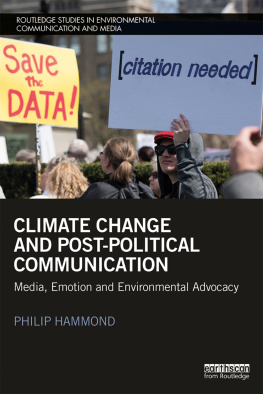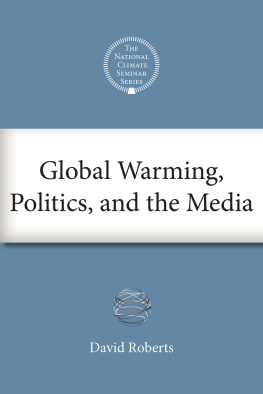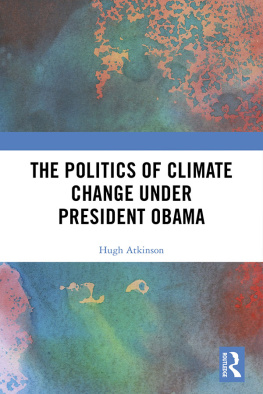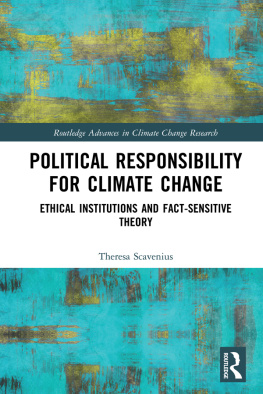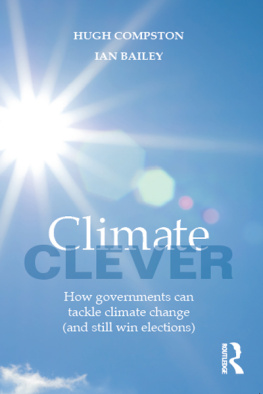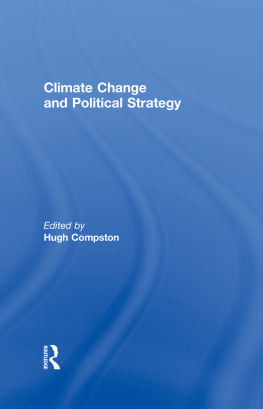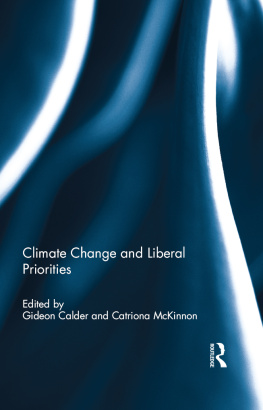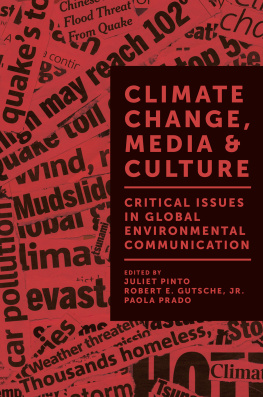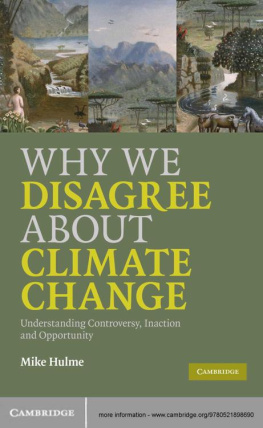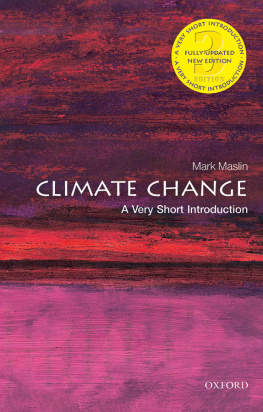This is a must read for anyone concerned with the workings of 21st-century fear culture and the media. Hammond provides an excellent account of how climate change has been integrated into a therapeutic outlook on public life.
Frank Furedi, Emeritus Professor of Sociology,
University of Kent, UK
Is climate change the ultimate global problem which must be solved through coordinated, collective action; or is this drive for consensus on climate change denying political subjectivity and obstructing the possibility of solving more pressing social injustices? Philip Hammonds new book, Climate Change and Post-Political Communication, offers an original and persuasive answer to this question by following the roles of media, news journalism and celebrity in the public framing of climate change.
Mike Hulme, Professor of Human Geography,
University of Cambridge, UK
CLIMATE CHANGE AND POST-POLITICAL COMMUNICATION
For many years, the objective of environmental campaigners was to push climate change on to the agenda of political leaders and to encourage media attention to the issue. By the first decade of the twenty-first century, it appeared that their efforts had been spectacularly successful. Yet just at the moment when the campaigners goals were being achieved, it seemed that the idea of getting the issue into mainstream discussion had been mistaken all along; that the consensus-building approach produced little or no meaningful action. That is the problem of climate change as a post-political issue, which is the subject of this book.
Examining how climate change is communicated in politics, news media and celebrity culture, Climate Change and Post-Political Communication explores how the issue has been taken up by elites as potentially offering a sense of purpose or mission in the absence of political visions of the future, and considers the ways in which it provides a focus for much broader anxieties about a loss of modernist political agency and meaning. Drawing on a wide range of literature and case studies, and taking a critical and contextual approach to the analysis of climate change communication, this book will be a valuable resource for students and scholars of environmental studies, communication studies, and media and film studies.
Philip Hammond is Professor of Media and Communications at London South Bank University, UK.
Routledge Studies in Environmental Communication and Media
Environmental Crises in Central Asia
From Steppes to Seas, from Deserts to Glaciers
Edited by Eric Freedman and Mark Neuzil
Environmental Advertising in China and the USA
The Desire to Go Green
Xinghua Li
Public Perception of Climate Change
Policy and Communication
Bjoern Hagen
Environmental Communication and Community
Constructive and Destructive Dynamics of Social Transformation
Tarla Rai Peterson, Hanna Ljunggren Berge, Andrea M. Feldpausch-Parker and Kaisa Raitio
Environmental Communication Pedagogy and Practice
Edited by Tema Milstein, Mairi Pileggi and Eric Morgan
Environmental Pollution and the Media
Political Discourses of Risk and Responsibility in Australia, China and Japan
Glenn D. Hook, Libby Lester, Meng Ji, Kingsley Edney and Chris G. Pope with contributions from Luli van der Does-Ishikawa
Environmental Communication and Critical Coastal Policy
Communities, Culture and Nature
Kerrie Foxwell-Norton
Climate Change and Post-Political Communication
Media, Emotion and Environmental Advocacy
Philip Hammond
CLIMATE CHANGE AND POST-POLITICAL COMMUNICATION
Media, Emotion and Environmental Advocacy
Philip Hammond
First published 2018
by Routledge
2 Park Square, Milton Park, Abingdon, Oxon OX14 4RN
and by Routledge
711 Third Avenue, New York, NY 10017
Routledge is an imprint of the Taylor & Francis Group, an informa business
2018 Philip Hammond
The right of Philip Hammond to be identified as author of this work has been asserted by him in accordance with sections 77 and 78 of the Copyright, Designs and Patents Act 1988.
All rights reserved. No part of this book may be reprinted or reproduced or utilised in any form or by any electronic, mechanical, or other means, now known or hereafter invented, including photocopying and recording, or in any information storage or retrieval system, without permission in writing from the publishers.
Trademark notice : Product or corporate names may be trademarks or registered trademarks, and are used only for identification and explanation without intent to infringe.
British Library Cataloguing-in-Publication Data
A catalogue record for this book is available from the British Library
Library of Congress Cataloging-in-Publication Data
A catalog record for this book has been requested
ISBN: 978-1-138-77749-1(hbk)
ISBN: 978-1-138-77750-7(pbk)
ISBN: 978-1-315-77259-2(ebk)
Typeset in Bembo
by Deanta Global Publishing Services, Chennai, India
Contents
I am grateful to Dr Hugh Ortega Breton, with whom I co-authored a number of essays and conference papers on environmentalism and film, for many interesting conversations about politics and emotion in relation to climate change and other issues.
My thanks also to another long-term collaborator, Dr Andrew Calcutt, and to my colleague Prof. James Woudhuysen, for their insightful comments on the draft manuscript. The books remaining faults result from me sometimes failing to follow their consistently sound advice.
Sincere thanks to my editor at Routledge, Annabelle Harris, and all her team, for their encouragement and forbearance.
As always, my biggest debt of gratitude is to my family for their tolerance of my often disruptive work schedule.
We have only just begun to understand what the idea of climate change is doing to us. Not just what it is doing to the ecological and physical conditions of our existence but, more importantly, to our political discourses, social relationships and imaginative worlds.
(Hulme 2010: 2734)
A strange thing has happened to the issue of climate change. For many years, it seemed that the objective of environmental campaigners was to push climate change on to the agenda of political leaders and to encourage media attention to the problem. The aim seemed to be to get everyone to agree that climate change was an important matter for public concern, and that action should be taken. It seemed to work. The politicians and journalists did pay attention, and (almost) everyone did agree that it was indeed very important. I watched this change happen at the university where I work. When I started here in the late 1990s, environmental concerns were not part of official university policy and nobody thought that was odd or unusual. Over the years, things gradually changed. Every office got a recycling bin. Low-energy lighting was installed, and turned off automatically if sensors detected no movement. When the university commissioned new buildings, they were designed on eco-friendly principles. Posters about sustainability appeared around the corridors and we held an exhibition about it in the courtyard. The environment became an important focus, not just of academic groups and research projects, but of corporate identity and institutional governance. Now, environmental concerns are very prominently part of official university policy and nobody thinks that is odd or unusual. A new consensus has been established; common-sense assumptions have shifted, not only in one university, but across society. Yet the strange thing is that just when everyone started to agree that climate change was a really important issue, it began to look as if that very agreement itself was a problem.

